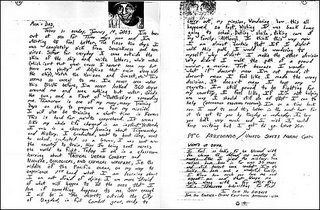One minute Stacy Bannerman is stuffing envelopes to promote an upcoming
peace workshop. The next her husband, Lorin, unexpectedly appears in
her office."I got the call," he says.
"What call?" she replies.
Does she have to ask? Don't they both know their life is poised to turn completely strange at any moment? Possibly even tragic?
"I'm going to Iraq."
His eyes watch her closely.
"No. No. No."
Yes,
yes, yes: Lorin's National Guard unit just got called up. And in a deep
part of him that he doesn't reveal to his wife, a professional peace
and justice activist, he's kind of looking forward to it.
It's
the fall of 2003, seven months after the war began, outside Seattle
where they live. They are the warrior and the anti-warrior, and their
years of living dangerously are about to begin.
She watches him
drive away in his new white Kia Sorento. The planet-hugger in her never
approved of his buying that SUV. Now, as her man prepares for
mobilization to the land of oil and blood, she sees the manufacturer's
name and thinks: "Killed in action."
The Bannermans are like
nobody else and everybody else with this country at war. Stacy, 40, and
Lorin, 45, dramatize an extreme version of the conversations, tensions,
compromises and leaps of faith taking place across America. As the
death count rises, public support for the war plummets, two black lines
on a neat, precise graph.
Beneath Stacy and Lorin's apparent
polarization, they share a messy truth of nuances and grays. She is
convinced this war was built on lies, yet her admiration for those who
choose to wear the uniform has only increased, even though she knows
some soldiers -- including, she would learn in anguished phone calls
from Iraq, her husband -- have been connected to the deaths of Iraqi
civilians.
Overshadowed by the controversial wattage of Cindy
Sheehan, Stacy is nevertheless a featured speaker in the peace
movement's marches, rallies and caravans, a leading advocate with the
group Military Families Speak Out, which claims about 3,000 members.
She recently published a book about being a soldier's antiwar wife,
"When the War Came Home."
Lorin felt the almost boyish appeal of
the military when he signed up for the Guard while in college. During
his yearlong deployment in Iraq, he harbored increasing doubts over the
reasons for the invasion but never wavered in his devotion to his
mission. He is, he says, "glad" to have fought in Iraq, where he was a
sergeant first class leading 34 soldiers in a mortar platoon. His
mission -- to beat back the insurgents lobbing rockets and mortar
shells in his sector -- was accomplished, and he earned a Bronze Star
for, in the words of the citation, "incredible speed and deadly
accurate response" in "taking the fight to the enemy."
"What
matters is that Lorin is the love of my life," Stacy says. "What
matters is that I remain true to myself. What matters is I'm big enough
to let him do the same."
Common values
They met
seven years ago in Spokane at a fundraiser to fight hunger. He was
helping manage food service that night and spied her looking at him.
She
had never married; he had been married once before. She was executive
director of the Martin Luther King Jr. Family Outreach Center in
Spokane, a position she would eventually leave amid controversy. (She
filed a complaint with the Washington State Human Rights Commission
alleging she suffered discrimination on the job because she was white;
the matter was settled in 2002 for undisclosed terms.)
They
discovered they had many values in common -- a belief in diversity and
a commitment to fairness and equal treatment based on the content of
one's character.
Stacy did not fall in love with a man in
uniform. Lorin had quit the Guard after about 15 years of service. Once
they were engaged, he decided to re-enlist so he could reach 20 years
and qualify for retirement benefits. Stacy was surprised. But this was
before Sept. 11, 2001. She rationalized the Guard was a conventional
outlet for a man like Lorin to peacefully serve his country.
After he got the call to go to Iraq, she did not always make his life easy. Sometimes, she said exactly the wrong thing.
It
would happen in moments when life within the paradox seemed unbearable,
forces both political and personal wrenching their relationship. In one
of their long pre-deployment conversations, he said, "There may come a
time when I've got someone at gunpoint, and I'll have to make a
decision. ... I can't be thinking of the enemy as human."
"If
that day comes," she replied, "and you're standing there, looking into
that person's face, I want you to imagine that it's me."
As soon
as she said it, she regretted it. The pacifist found herself wondering,
she later wrote, if she had planted the seed of doubt that would lead
to a moment of hesitation, resulting in her husband's death. Is a
pacifist supposed to have such regrets?
Stacy still cringes, and Lorin hasn't forgotten either.
"It's not what I need to be thinking about. I don't need to have that moment of doubt," he says.
But,
he adds, "there were times when she probably didn't say the right
thing, but she said what was on her mind. That's something that you
need to accept. This is where she's at, this is what she's going
through."
Paths diverge
Lorin admits he couldn't
help detaching himself emotionally from her. "I did notice a wall was
coming up," he says. "I was focused on what I was getting ready to do,
getting ready to be asked to do. Put my life on the line. And I had
responsibilities for other people's lives."
The thing that
shocked her most was when he confessed that a part of him was looking
forward to the war. At last, the real thing.
"This is what I've
trained for, this is now actually going to happen," he says. "There was
a little bit of that in there, excitement, if you want to put it that
way. Here I get to go do something I've been training for for the last
16 or 17 years."
Stacy recalls her reaction: "Please tell me I'm
not hearing this. ... I can't believe he's talking about going to war
like it's some great opportunity he doesn't want to miss."
One
thing she could understand: By the fall of 2003 when Lorin was called
up, it was becoming apparent Iraq possessed no weapons of mass
destruction, and Lorin was having some misgivings about the logic
behind the war. But he had a duty, and he felt a deep loyalty and
responsibility to his fellow soldiers. That was why he was going to
war, and that was reasoning his activist wife accepted, even admired.
While
he was away, she kept the window blinds drawn. That way, she would not
be able to see a government car pull up to announce another casualty.
Therefore, in the superstitious logic of the home front, no car would
ever appear.
And she found common ground with the group Military Families Speak Out.
Shaken by deaths
READ MORE ABOUT STACY HERE


















